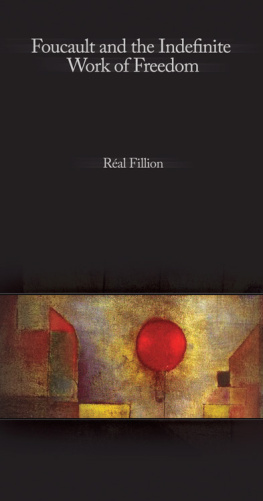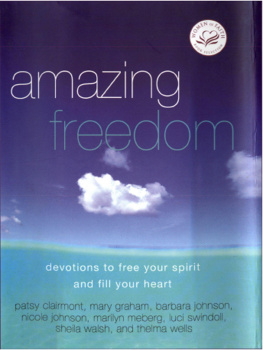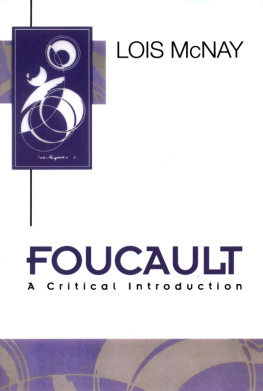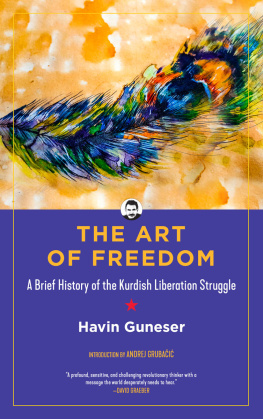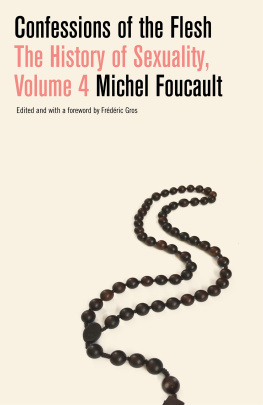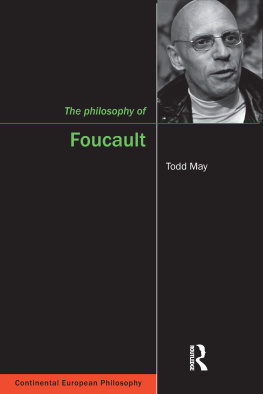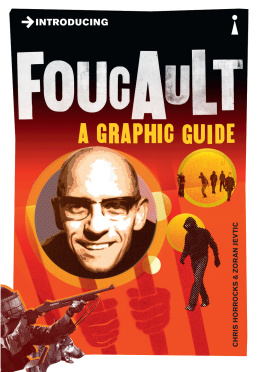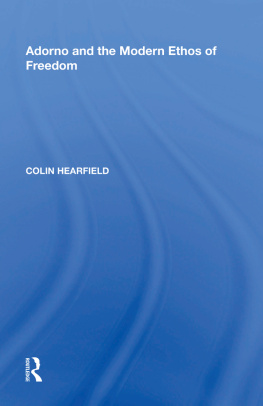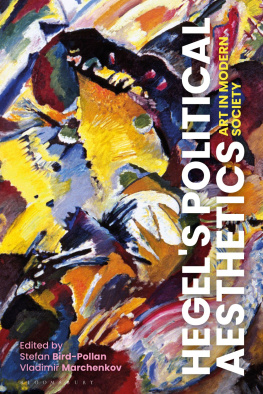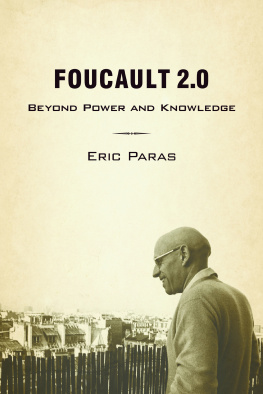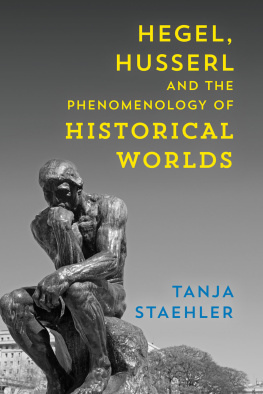University of Ottawa Press, 2012
The University of Ottawa Press acknowledges with gratitude the support extended to its publishing list by Heritage Canada through the Canada Book Fund, by the Canada Council for the Arts, by the Federation for the Humanities and Social Sciences through the Awards to Scholarly Publications Program, by the Social Sciences and Humanities Research Council, and by the University of Ottawa.
www.press.uottawa.ca
Library and Archives Canada Cataloguing in Publication
Fillion, Ral Robert, 1963
Foucault and the indefinite work of freedom / Ral Fillion.
(Philosophica, ISSN 1480-4670)
Includes bibliographical references and index.
Electronic monograph issued in multiple formats.
Also issued in print format.
ISBN 978-0-7766-1999-6
1. Foucault, Michel. 2. Liberty--Philosophy. 3. History--Philosophy. I. Title. II. Series: Collection Philosophica
B2430.F724F54 2012 194 C2012-905651-0
Acknowledgements
The following chapters incorporate material previously published.
Chapter One incorporates, with modifications, text published as: LIde de lHistoire chez Michel Foucault, Science et Esprit 55.1 (2003): 2334.
Chapter Three incorporates, with modifications, text published as: Foucault after Hyppolite: Towards an A-theistic Theodicy, The Southern Journal of Philosophy XLIII.1 (2005): 7993.
Chapter Six incorporates, with modifications, text from both Freedom, Responsibility and the American Foucault, Philosophy and Social Criticism 30.1 (2004): 11526 and, especially, Foucault on History and the Self, Laval Thologique et Philosophique 54.1 (1998): 14362.
I wish to thank the publishers of these journals for their permissions.
I would like to acknowledge the University of Sudbury for its support.
This book has been published with the help of a grant from the Canadian Federation for the Humanities and Social Sciences, through the Aid to Scholarly Publications Program, using funds provided by the Social Sciences and Humanities Research Council of Canada.
Introduction
Making Sense of History Making Sense of Us
Like our lives, does history unfold? To what extent is history relevant to our attempts to make sense of our unfolding lives? These are the underlying questions that animate the writing of this book. It is driven by the sense that we should not neglect history as a way of framing how we make sense of our lives, even as we should not abuse it either. It is a book born of the sentiment, like Nietzsches, that history can be and is both used and abused and that history can be and is of significance for life. But it is also a book that is born not only out of a sentiment but out of a commitment, like Hegels, to the intelligibility of history, to the endeavour to draw out and to appreciate the sense that it contains. Note that both the sentiment and the commitment, taken together, suggest that history is both something we create (as we make use of it) and something larger than us, in which we participate. Karl Marx probably captured this double sense best when he wrote, Men make their own history, but they do not make it just as they please; they do not make it under circumstances chosen by themselves, but under circumstances directly encountered, given and transmitted from the past.
As the mention of the names of such thinkers as Nietzsche, Hegel and Marx suggests, this is an exploration in the philosophy of history; more specifically it is a work that appeals to what has come to be called speculative philosophy of history, so called as a contrast to analytic philosophy of history. This distinction between speculative and analytic philosophy of history is an interesting one but one that has outlived its usefulness. As a check against modes of philosophizing that would abusively pretend to give us the meaning of the historical process as a whole, and as a way of insisting that we examine more carefully and rigorously the kinds of claims put forward in the name of something called history, a philosophy of history that calls itself analytic certainly makes sense and has produced important work. But as a stricture against any effort to think about history as a process or as a whole (or both), and as a restriction to consider exclusively the production of the work of those who call themselves historians, such an approach does not serve our sense of history well. Worse, it serves to block a fuller appreciation of the significance that history can have for making sense of our lives.
The principal reason I think the distinction between analytic and speculative philosophy of history has outlived its usefulness is the way it severs history from a consideration of the fact that our lives unfold, that it has a temporal structure that can be understood in terms of a present shaped by a past and moving into a future. In this, it is merely following upon the increasing disciplinarization of history and historiography. Hayden White has been writing for a long time about the kinds of limitations such a professionalization of historical investigation has had on our appreciation of history, and I will return to Whites work a number of times in what follows. For the moment, I would like to mention two points he raises in a recent discussion on the public role of history. The first he takes over from Michael Oakeshott, who asks us to consider how this professionalization increasingly drives a wedge between two senses of the past which he
calls the historical past, the preserve of professional historians interested in disinterested study of the past as it really was and as an end in itself, on the one hand, and, on the other hand, the practical past, the past considered as a storehouse of memory, ideals, examples, events worthy of remembrance and repetition, and so on, the kind of past ordinary people and politicians, ministers, ex-soldiers, and social reformers carry around with them as an imagined reality serving in lieu of both religion and metaphysics as a paradigm or bedrock of the real.
What this wedge does is increasingly alienate us from a fuller sense of our relation to history because it insists on treating a part of it as a distinct object understood independently as the past, in explicit contradistinction to the correlative conceptions of the present and the future. I do not mean to suggest that one cannot and should not bracket any of these correlative conceptions in order to focus ones attention on a single one, just as the historian does when she focuses on what has happened in the past, or as most of us do in our daily preoccupations with the demands of the present. But, of course, such present preoccupations are the preoccupations they are because they are framed not solely in terms of a self-contained present but also with reference to both the past and the future, through our various commitments, for example I promised yesterday that I would be there tomorrow. To link these correlative conceptions explicitly is precisely what it means to say that our lives are unfolding. The historian, too, in her disinterested interest in what happened in the past, considers that past from a particular place in an unfolding present.
If a concern with this unfolding quality of the past, the present and the future is borne in mind, however, then the traditional concern of the speculative philosophy of history with the

